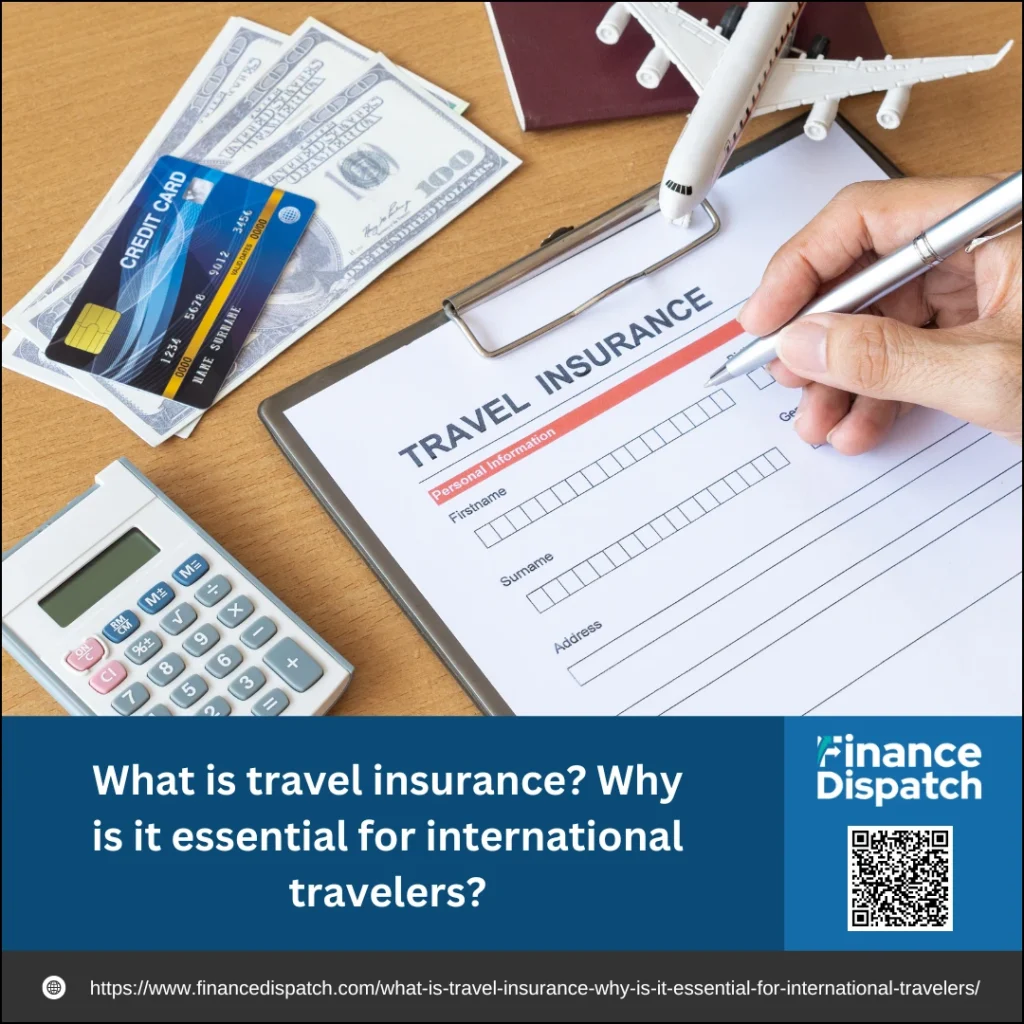Traveling to new destinations is an exciting experience, but it also comes with uncertainties. From unexpected flight cancellations to medical emergencies, international travel can quickly become stressful and expensive. This is where travel insurance plays a crucial role. Travel insurance acts as a safety net, offering financial protection against trip interruptions, lost luggage, medical expenses, and other unforeseen events. Whether you’re planning a short vacation or an extended trip abroad, having travel insurance ensures peace of mind, allowing you to focus on creating memories rather than worrying about potential mishaps. In this article, we will explore what travel insurance is, what it covers, and why it is an essential investment for every international traveler.
What is Travel Insurance?
Travel insurance is a type of financial protection that covers unexpected events that may occur before or during a trip. It serves as a safety net for travelers, offering reimbursement or compensation for various travel-related risks, including medical emergencies, trip cancellations, lost baggage, flight delays, and more. Whether you’re traveling domestically or internationally, travel insurance provides peace of mind by mitigating potential financial losses due to unforeseen circumstances. Policies vary based on coverage types, destinations, and individual needs, ensuring that travelers are prepared for any disruptions that might impact their journey.
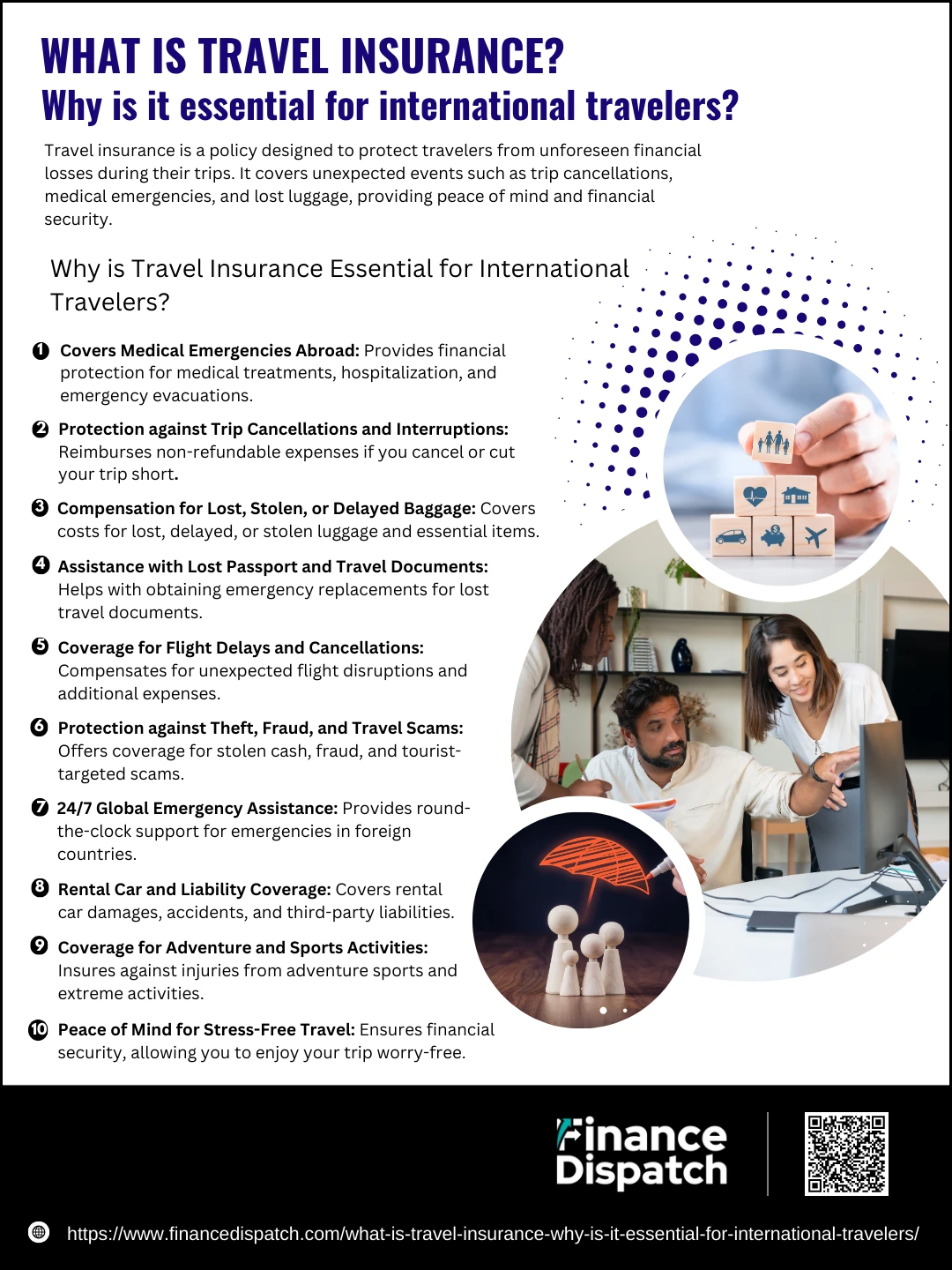 Why is Travel Insurance Essential for International Travelers?
Why is Travel Insurance Essential for International Travelers?
Traveling to a foreign country is an exciting experience, offering new adventures, cultures, and memories. However, international travel also comes with uncertainties that can disrupt even the most carefully planned trips. Unexpected medical emergencies, flight delays, lost baggage, or trip cancellations can lead to significant financial losses and stress. This is where travel insurance becomes essential. It acts as a safety net, protecting travelers from unforeseen expenses and ensuring that disruptions don’t turn into financial burdens. Below are the key reasons why having travel insurance is a must for international travelers.
1. Covers Medical Emergencies Abroad
Healthcare expenses in foreign countries can be extremely high, especially in regions where medical treatment is costly. If you fall sick or get injured while traveling, a travel insurance policy covers hospitalization, emergency treatments, doctor visits, and even medical evacuation if necessary. Without insurance, these expenses can be overwhelming, especially if the country requires upfront payments for medical care.
2. Protection Against Trip Cancellations and Interruptions
Sometimes, unforeseen events such as illness, a family emergency, or natural disasters can force you to cancel your trip or cut it short. Since most travel bookings are non-refundable, canceling a trip could result in losing thousands of dollars. Travel insurance reimburses prepaid expenses, allowing you to reschedule or recover your financial losses.
3. Compensation for Lost, Stolen, or Delayed Baggage
Lost luggage is a common travel issue, with thousands of bags misplaced by airlines every year. If your baggage is delayed, lost, or stolen, travel insurance provides compensation for essential items, clothing, and other necessities, ensuring that you’re not left stranded without your belongings.
4. Assistance with Lost Passport and Travel Documents
Losing your passport in a foreign country can be a nightmare, as it is the most critical document for re-entry into your home country. Travel insurance provides assistance with obtaining emergency replacements and covers costs related to lost passports, visas, or other essential travel documents.
5. Coverage for Flight Delays and Cancellations
Flight cancellations and long delays are frustrating and can lead to extra expenses for accommodations, food, or transportation. Travel insurance offers compensation for missed connections, delays, and additional expenses, helping you stay on track without significant financial setbacks.
6. Protection Against Theft, Fraud, and Travel Scams
Tourists are often targeted for theft, scams, or pickpocketing, leading to loss of money, credit cards, and valuables. Some travel insurance policies offer coverage for stolen cash and fraud protection, giving you financial relief in case of theft-related incidents.
7. 24/7 Global Emergency Assistance
Being in an unfamiliar country can be overwhelming, especially during emergencies. Most travel insurance providers offer 24/7 emergency assistance services to help travelers find hospitals, contact embassies, or arrange emergency transportation, ensuring you have support when you need it the most.
8. Rental Car and Liability Coverage
If you plan on renting a car abroad, travel insurance can cover damages, accidents, and liability costs that might otherwise leave you with high out-of-pocket expenses. Some policies even cover damages that rental agencies might not, providing additional protection.
9. Coverage for Adventure and Sports Activities
Many international travelers engage in adventurous activities like scuba diving, skiing, hiking, and skydiving. Some travel insurance policies offer coverage for injuries related to these activities, ensuring that adventure seekers can explore with peace of mind.
10. Peace of Mind for Stress-Free Travel
Above all, travel insurance offers peace of mind, knowing that you are financially protected against various risks. Instead of worrying about unexpected events, you can focus on enjoying your trip and making lifelong memories.
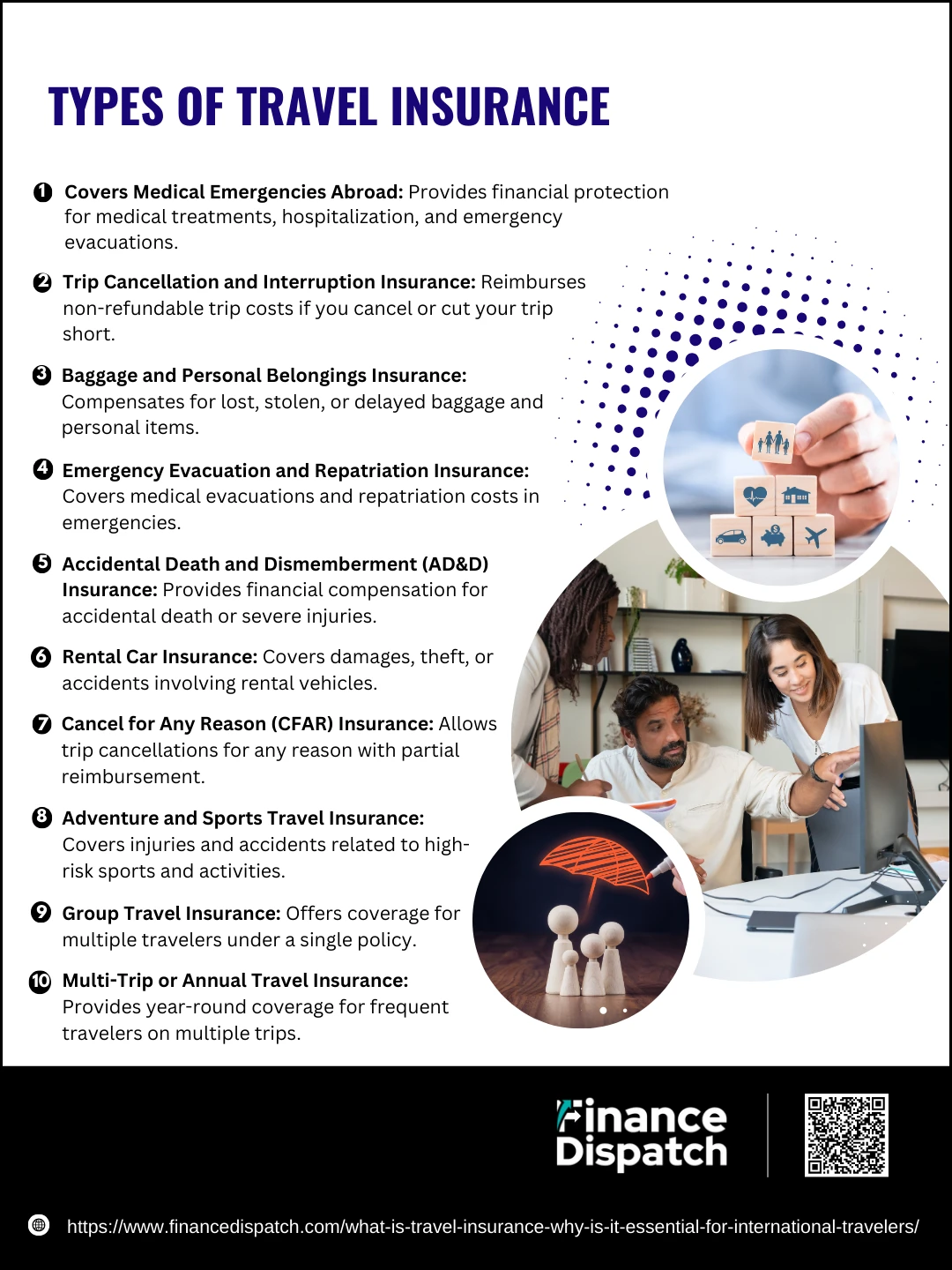 Types of Travel Insurance
Types of Travel Insurance
Traveling is an exciting experience, but it also comes with uncertainties. Unexpected events such as medical emergencies, trip cancellations, or lost baggage can disrupt even the best-planned trips. This is where travel insurance becomes essential. There are different types of travel insurance policies tailored to meet various needs, whether you’re traveling for leisure, business, or adventure. Understanding the types of travel insurance available can help you choose the right coverage for a worry-free journey. Below are the main types of travel insurance that travelers should consider.
1. Medical Travel Insurance
This type of insurance covers medical expenses incurred due to illness or injuries while traveling. It includes hospitalization, doctor visits, prescription medications, and sometimes emergency medical evacuation if needed. It is especially important for travelers visiting countries where healthcare is expensive or where their home health insurance doesn’t provide coverage.
2. Trip Cancellation and Interruption Insurance
Trip cancellations can happen due to unexpected illness, natural disasters, or emergencies. This insurance reimburses non-refundable trip expenses like flights, hotels, and tour bookings. Trip interruption coverage also helps if you need to cut your trip short due to unforeseen circumstances.
3. Baggage and Personal Belongings Insurance
Losing luggage while traveling can be frustrating and costly. This type of insurance covers lost, stolen, or delayed baggage, compensating travelers for essential items and valuables. Some policies also cover personal items like cameras, laptops, and jewelry.
4. Emergency Evacuation and Repatriation Insurance
In case of serious medical emergencies where immediate evacuation to a better-equipped facility is necessary, this insurance covers the cost of air ambulances, medical transportation, and repatriation back to your home country if required.
5. Accidental Death and Dismemberment (AD&D) Insurance
This insurance provides financial compensation in case of accidental death or severe injuries leading to permanent disability. It often includes coverage for fatal accidents that occur during flights, cruises, or other modes of transportation.
6. Rental Car Insurance
For travelers who rent cars abroad, rental car insurance covers damages, theft, or accidents involving the rental vehicle. This helps avoid costly out-of-pocket expenses that may not be covered by a personal auto insurance policy.
7. Cancel for Any Reason (CFAR) Insurance
Unlike standard trip cancellation insurance, CFAR coverage allows travelers to cancel their trip for any reason and still receive partial reimbursement (typically 50% to 75% of trip costs). This is useful for travelers who want maximum flexibility in case of last-minute changes.
8. Adventure and Sports Travel Insurance
For thrill-seekers engaging in activities like skiing, scuba diving, hiking, or skydiving, this type of insurance provides coverage for injuries and accidents related to high-risk sports. Many standard policies exclude these activities, so this additional coverage is necessary for adventure travelers.
9. Group Travel Insurance
Designed for families, tour groups, or business travelers, group travel insurance provides coverage for multiple travelers under a single policy, making it more cost-effective and convenient for group trips.
10. Multi-Trip or Annual Travel Insurance
Frequent travelers can opt for multi-trip insurance, which provides coverage for multiple trips within a year. This eliminates the need to purchase a new policy for every trip and can be a cost-effective option for business travelers or those who travel frequently.
What Does Travel Insurance Cover?
Travel insurance provides financial protection against unexpected situations that can disrupt your trip. Whether it’s a medical emergency, lost luggage, or a flight delay, having the right coverage can save you from unexpected expenses and stress. Different policies offer various levels of protection, so it’s essential to understand what your travel insurance covers before purchasing. Below is a table outlining the key coverage areas of travel insurance.
Table: Travel Insurance Coverage Details
| Coverage Type | Description |
| Medical Expenses | Covers doctor visits, hospital stays, emergency treatments, and prescription medications if you get sick or injured while traveling. |
| Emergency Medical Evacuation | Pays for transportation to the nearest suitable medical facility or repatriation to your home country in case of a severe medical emergency. |
| Trip Cancellation | Reimburses non-refundable expenses if you cancel your trip due to covered reasons like illness, injury, natural disasters, or family emergencies. |
| Trip Interruption | Covers costs if you need to cut your trip short due to unexpected events, including medical emergencies or personal crises. |
| Flight Delays & Cancellations | Provides compensation for hotel stays, meals, and rebooking fees if your flight is delayed or canceled. |
| Lost, Stolen, or Delayed Baggage | Reimburses the cost of lost, stolen, or delayed luggage, including essential personal items and clothing. |
| Accidental Death & Dismemberment (AD&D) | Provides financial compensation to beneficiaries in case of accidental death or severe injury resulting in disability during travel. |
| Rental Car Insurance | Covers damages, theft, or accidents involving rental vehicles while traveling. |
| Cancel for Any Reason (CFAR) | Allows you to cancel your trip for any reason and receive partial reimbursement, typically between 50%-75% of non-refundable costs. |
| Adventure & Sports Coverage | Offers protection for injuries or accidents related to adventure activities like skiing, scuba diving, or hiking. |
| Travel Assistance Services | Provides 24/7 emergency support, including lost passport assistance, legal help, and medical referrals. |
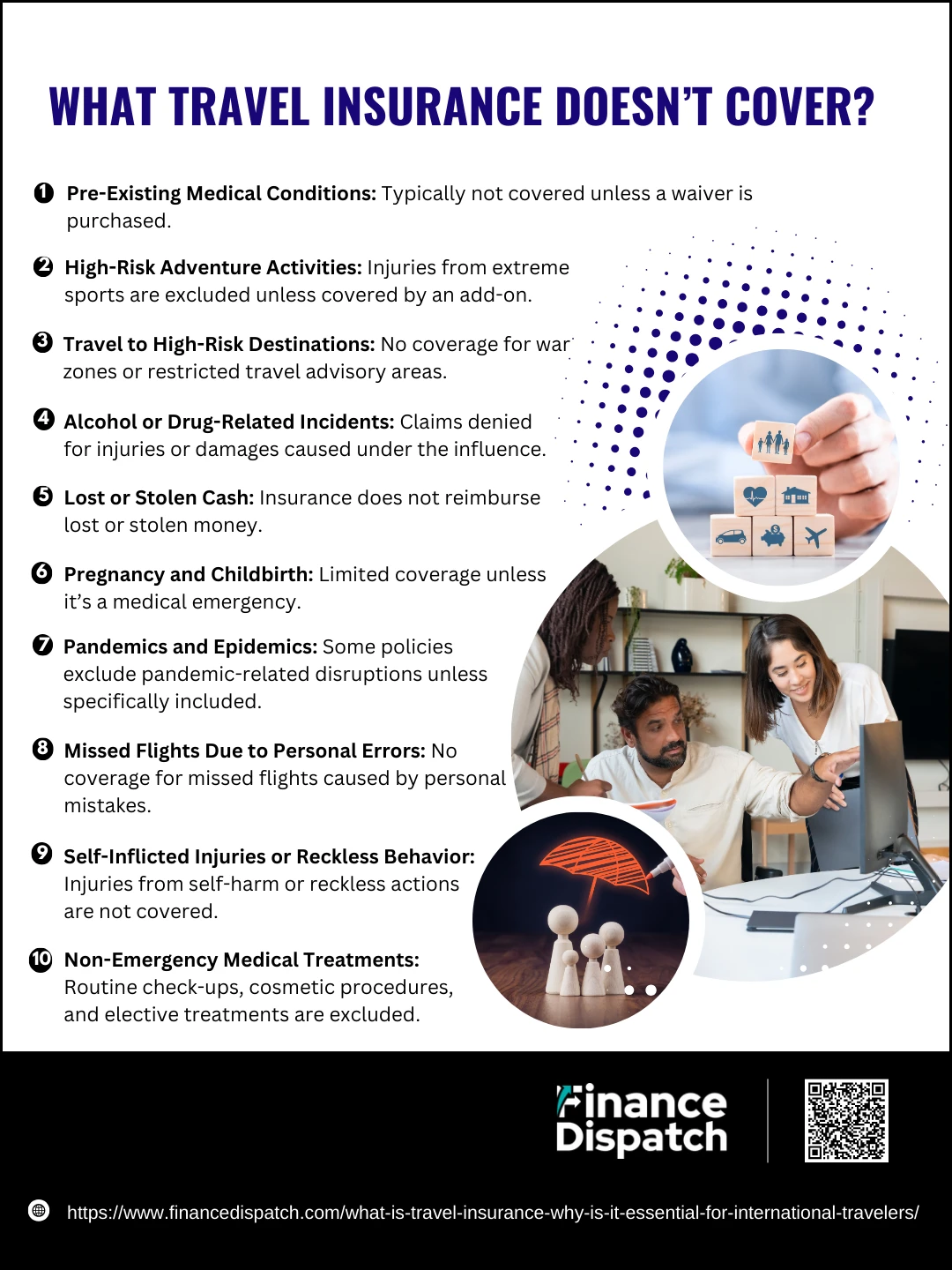 What Travel Insurance Doesn’t Cover?
What Travel Insurance Doesn’t Cover?
While travel insurance offers protection against many unexpected events, it does not cover everything. Every policy comes with specific exclusions and limitations, which travelers should be aware of before purchasing. Understanding what is not covered can help prevent surprises when filing a claim. Below are some of the most common exclusions in travel insurance policies.
1. Pre-Existing Medical Conditions
Most travel insurance policies do not cover pre-existing health conditions unless you purchase a waiver. If you have ongoing health issues, check with your provider to see if they offer coverage.
2. High-Risk Adventure Activities
Standard travel insurance typically excludes injuries from extreme sports such as skydiving, bungee jumping, or mountaineering. If you plan on participating in high-risk activities, look for an adventure sports add-on.
3. Travel to High-Risk Destinations
Countries with active war zones, political instability, or government-issued travel advisories may not be covered. Always check your policy’s list of restricted destinations before booking your trip.
4. Alcohol or Drug-Related Incidents
If you are injured or cause damage while under the influence of alcohol or drugs, your claim may be denied. Travel insurance does not cover reckless behavior.
5. Lost or Stolen Cash
While travel insurance covers lost or stolen luggage, it does not usually reimburse cash, even if you have receipts. Consider using credit cards and travel-friendly payment methods instead.
6. Pregnancy and Childbirth
Most policies do not cover pregnancy-related expenses unless it is a medical emergency. If you’re pregnant, check the policy’s maternity coverage details before traveling.
7. Pandemics and Epidemics
Some travel insurance policies exclude coverage for pandemics, epidemics, and government travel bans, unless specifically mentioned in the policy. COVID-19-related coverage is available in some plans, but not all.
8. Missed Flights Due to Personal Errors
If you arrive late to the airport and miss your flight due to oversleeping, traffic, or scheduling mistakes, travel insurance will not cover the rebooking cost.
9. Self-Inflicted Injuries or Reckless Behavior
Any injuries resulting from self-harm, suicide attempts, or reckless actions (such as ignoring safety warnings) are not covered under most travel insurance plans.
10. Non-Emergency Medical Treatments
Routine check-ups, dental cleanings, cosmetic procedures, and elective surgeries are generally not covered unless they result from an accident during your trip.
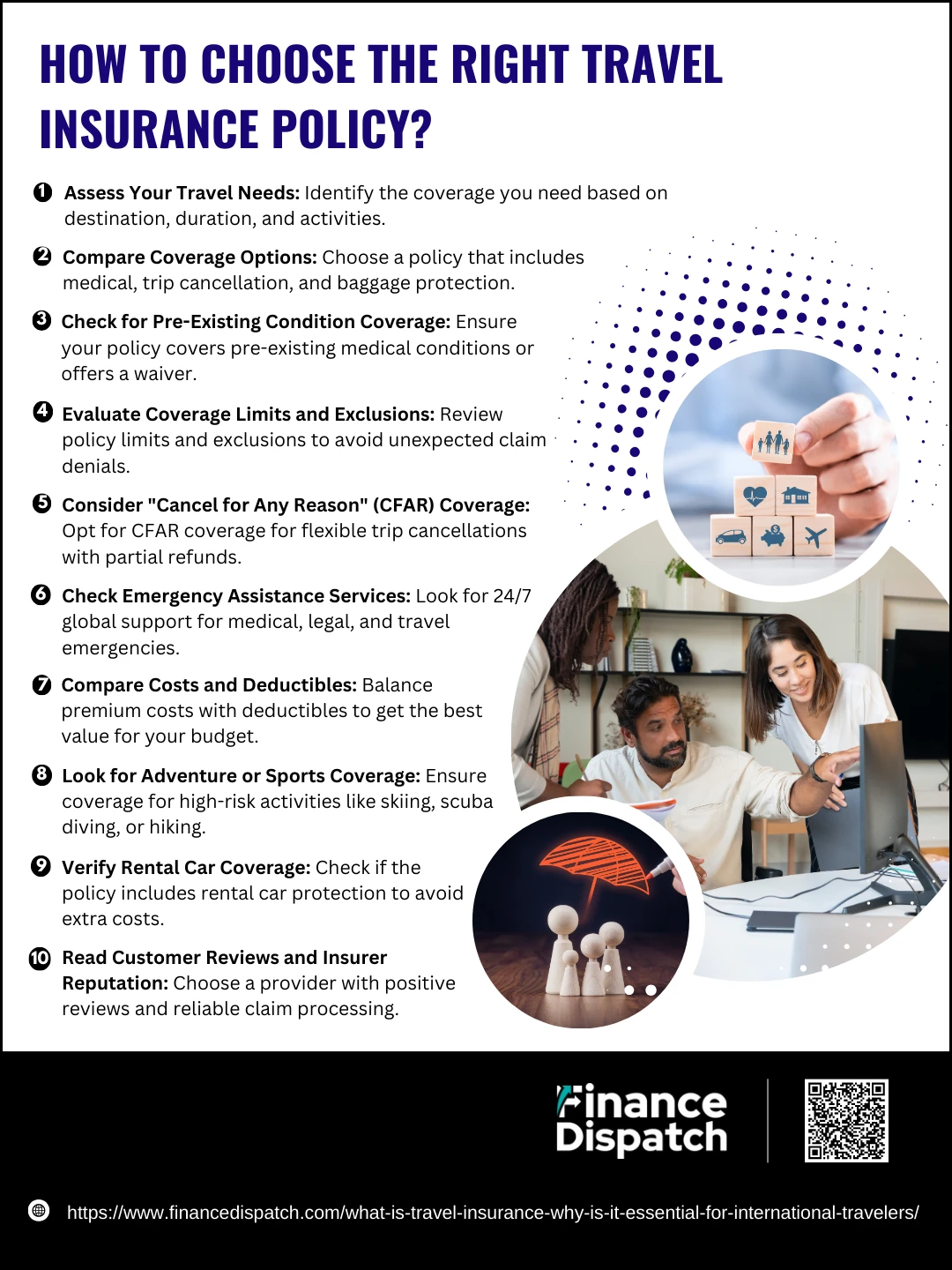 How to Choose the Right Travel Insurance Policy?
How to Choose the Right Travel Insurance Policy?
Choosing the right travel insurance policy can be overwhelming with so many options available. The best policy depends on your travel plans, health conditions, and the level of coverage you need. A well-chosen travel insurance policy ensures peace of mind by covering medical emergencies, trip cancellations, lost baggage, and more. To make the right decision, consider the following key factors before purchasing your travel insurance.
1. Assess Your Travel Needs
Before selecting a policy, determine what kind of coverage you need. Are you traveling internationally or domestically? Will you be engaging in adventure sports? Consider factors such as destination risks, duration, and activities planned.
2. Compare Coverage Options
Not all travel insurance policies offer the same level of protection. Look for a plan that covers medical expenses, trip cancellations, lost baggage, and emergency evacuations. Choose comprehensive coverage if you want maximum protection.
3. Check for Pre-Existing Condition Coverage
If you have a pre-existing medical condition, ensure that your policy covers it or offers a waiver. Some insurers require you to purchase coverage within a certain timeframe after booking your trip to qualify for pre-existing condition benefits.
4. Evaluate Coverage Limits and Exclusions
Every policy has a coverage limit for medical expenses, baggage loss, and cancellations. Make sure the policy offers enough coverage for your needs. Also, check the exclusions to avoid surprises when filing a claim.
5. Consider “Cancel for Any Reason” (CFAR) Coverage
If you want flexibility, look for a policy that offers Cancel for Any Reason (CFAR) coverage. This allows you to cancel your trip for any reason and still receive a partial refund (typically 50%-75% of non-refundable costs).
6. Check Emergency Assistance Services
A good travel insurance policy provides 24/7 emergency assistance for medical emergencies, lost passports, legal issues, and trip disruptions. Choose an insurer with a reliable global support network.
7. Compare Costs and Deductibles
Premiums vary based on coverage level, traveler’s age, trip duration, and destination. Also, check the deductible amount—a lower premium might come with a higher deductible, meaning you’ll pay more out of pocket before the insurance kicks in.
8. Look for Adventure or Sports Coverage
If you’re planning skiing, scuba diving, hiking, or other high-risk activities, ensure your policy includes coverage for adventure sports. Many standard policies exclude injuries from extreme activities unless you purchase an add-on.
9. Verify Rental Car Coverage
If you’re renting a car during your trip, check whether your travel insurance includes rental car damage coverage. This can help you avoid paying extra fees for the rental company’s insurance.
10. Read Customer Reviews and Insurer Reputation
Not all travel insurance companies handle claims efficiently. Check customer reviews, insurer ratings, and claim processing times to choose a trustworthy provider.
How Much Does Travel Insurance Cost?
The cost of travel insurance varies based on several factors, including your trip’s total cost, destination, duration, age, and the type of coverage you select. On average, travel insurance costs between 4% and 10% of the total trip cost, but this can fluctuate depending on additional coverage options and individual needs. Understanding what influences the price of travel insurance can help you find the best policy at the right price. Below are the key factors that determine travel insurance costs.
Factors That Affect Travel Insurance Costs:
- Trip Cost – The more expensive your trip, the higher your insurance premium, as coverage is often based on the total amount of prepaid, non-refundable expenses.
- Traveler’s Age – Older travelers generally pay higher premiums due to increased medical risks and the likelihood of needing medical assistance.
- Trip Duration – Longer trips cost more to insure since they increase the chances of trip disruptions, medical emergencies, and other covered incidents.
- Destination – Travel to certain destinations with high healthcare costs or political instability may lead to higher insurance premiums.
- Type of Coverage – Comprehensive policies with medical coverage, trip cancellations, baggage loss, and emergency evacuations cost more than basic policies that cover only specific risks.
- Pre-Existing Medical Conditions – If you have a pre-existing condition, your premium may be higher, especially if you require a pre-existing condition waiver for coverage.
- Adventure or Sports Coverage – If you’re engaging in activities like skiing, scuba diving, or hiking, adding adventure sports coverage can increase the overall cost of your policy.
- Cancel for Any Reason (CFAR) Coverage – Policies that offer CFAR coverage typically cost 40-50% more than standard travel insurance due to their flexibility in allowing cancellations for any reason.
- Number of Travelers – Family or group travel insurance can be more cost-effective than purchasing individual policies for each traveler.
- Deductibles and Coverage Limits – Policies with lower deductibles and higher coverage limits tend to be more expensive but provide better financial protection.
Common Myths about Travel Insurance
Many travelers believe that travel insurance is unnecessary or that their credit card already provides full coverage. These misconceptions can leave them vulnerable to unexpected costs and complications during their trip. Travel insurance is designed to protect against medical emergencies, trip cancellations, lost baggage, and other travel-related risks. However, several myths prevent travelers from purchasing the right coverage. Below are some of the most common myths about travel insurance and the reality behind them.
Common Myths about Travel Insurance:
- “I don’t need travel insurance if I’m young and healthy.”
Even if you’re in perfect health, accidents, illnesses, or trip disruptions can happen unexpectedly. Travel insurance provides financial security for unforeseen situations. - “My credit card offers all the travel insurance I need.”
While some credit cards provide travel protection, their coverage is often limited to trip cancellations or rental car insurance. They may not cover medical emergencies or trip interruptions. - “Travel insurance is too expensive.”
Travel insurance typically costs between 4% and 10% of your total trip cost, which is a small price compared to the financial risks of medical emergencies or trip cancellations. - “I can buy travel insurance any-time before my trip.”
Some benefits, like coverage for pre-existing medical conditions or “Cancel for Any Reason” (CFAR) policies, require early purchase within a set time after booking your trip. - “Travel insurance covers everything.”
While comprehensive policies provide extensive coverage, they still have exclusions, such as extreme sports, pre-existing conditions, and certain high-risk destinations. - “Domestic travelers don’t need travel insurance.”
Even if you’re traveling within your own country, travel insurance can cover trip cancellations, lost baggage, and medical emergencies not covered by your primary health insurance. - “I don’t need travel insurance if my airline or hotel offers refunds.”
Airlines and hotels may offer refunds in specific cases, but many bookings are non-refundable. Travel insurance ensures you’re reimbursed even if the provider refuses to refund your expenses. - “I can file a claim for any reason.”
Standard travel insurance policies only cover specific events like illness, severe weather, or emergencies. If you want to cancel for personal reasons, you need cancel for Any Reason (CFAR) coverage. - “If nothing goes wrong, I wasted my money on travel insurance.”
Travel insurance is peace of mind—just like home or car insurance, you hope not to use it, but having it ensures you’re protected if something unexpected happens.
Conclusion
Travel insurance is an essential safeguard that provides financial protection and peace of mind for travelers facing unexpected situations. Whether it’s a medical emergency, trip cancellation, lost baggage, or flight delay, having the right insurance ensures that you are covered against unforeseen expenses. While misconceptions about travel insurance may lead some to overlook its importance, understanding the real benefits can help travelers make informed decisions. Investing in a comprehensive travel insurance policy allows you to enjoy your journey with confidence, knowing that you are prepared for any challenges that may arise. Before your next trip, take the time to compare policies and choose coverage that best suits your needs, so you can focus on creating memorable experiences without unnecessary worries.



